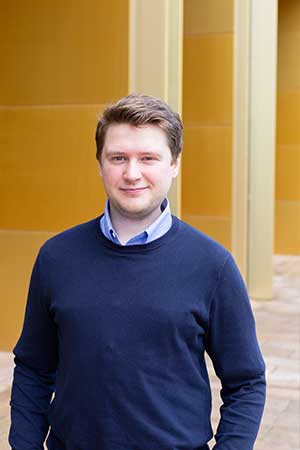PhD History student Liam McLeod says that the vibrant research culture in the department means that there is always something to get involved in. We find out more about his experience as a researcher at the University of Birmingham.
 Why did you choose to study a PhD in History?
Why did you choose to study a PhD in History?
“For me, historical study is inseparable from the way I view the world. There’s something profound to be learnt from the alterity of history; I’ve never felt more comfortable navigating the modern world than when I’m engrossed in the medieval one. History has given me a window into perspectives wholly different from my own and I cannot think of anything more intellectually enriching. The PhD allows me to really get to know my sources in a way that my BA and MA never could, and it allows me to engage with the wider academic community in a way that constantly brings new challenges and excitement.”
Why did you choose to undertake research at the University of Birmingham?
“I did both my MA and BA at the University of Birmingham. I joke with colleagues that the university hasn’t yet shaken me off yet! Ultimately, I chose Birmingham for two reasons: it has the research specialisms that suited my research questions and it has the research environment that I was looking for. Birmingham has a global outlook on the Middle Ages and this is constantly reinforced by the interdisciplinary conversations I have every day. In fact, I’m organising a conference in November 2019 with colleagues at Birmingham, Manchester, and Nottingham to induce more of these conversations across different temporal specialisms. It seems natural that the ideas for this conference started at the University of Birmingham.”
What are the best things about your course?
“Before I started my PhD I was constantly warned that it would be a lonely experience and that I should prepare for that. Truthfully, I haven’t found that to be the case at all. The vibrant research community at Birmingham has meant that I have never felt alone in the School of History and Cultures (SHaC); there's always something to get involved in or someone to share your experiences with. Granted, no one is working on the same thing (let alone at the same time) but that’s the nature of research. The welfare support available in SHaC is also phenomenal. I cannot praise them enough.”
What is life like as a researcher at the University of Birmingham?
“Busy. In my experience, Birmingham promotes the sort of academic culture which encourages the best in you. All of my colleagues are driven and passionate about their work. What I like most is how everyone produces their best because they want to and because they feel encouraged by the community of scholars around them. There’s no room for rivalry or toxic competition in my cohort. It’s extremely liberating and we’re fortunate to have that sort of environment.”
What support have you received during your PhD?
“My supervisory relationships have been extremely supportive in my scholarly development. We work at a pace which pushes me to achieve whilst not overwhelming me. In my first year, I fell ill and had to take a brief leave of absence. I was initially embarrassed to take time away from my research but SHaC Welfare, my supervisors, and my peers quickly disabused me of any guilt. Thanks to their support, I hit the ground running when I returned to my work and since then I’ve made progress that I’m really proud of.”
Outside of your research, what experience have you gained and how will it help you in the future?
“I knew that the PhD would give me a lot more by the end of the programme than just an eighty-thousand-word thesis. I didn’t expect to have been involved in so much so soon though. This last year alone I have spoken at two different conferences, I’m hosting a conference in November, I’m publishing a special edition of a journal this summer (2019) and I’ve taught undergrads for two semesters. I’m now comfortable and confident in explaining my research ideas to the wider academic community – more than ever, I believe in my own academic worth.”
Find out more studying for a PhD in History over on our course pages.